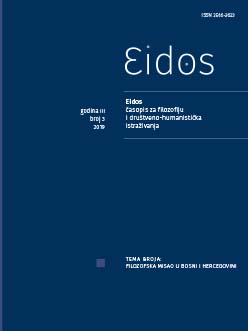Kasna islamska filozofija: ključni pojmovi Mulla Sadraovog filozofskog mišljenja
Later Islamic Philosophy: Key Concepts of Mulla Sadra’s Philosophical Thought
Author(s): Rusmir ŠadićSubject(s): Epistemology, Islam studies, Middle-East Philosophy, Philosophy of Religion, Ontology
Published by: Udruženje za filozofiju i društveno-humanistička istraživanja “Eidos”
Keywords: Islamic philosophy; ontology; epistemology; eschatology; Mulla Sadra;
Summary/Abstract: The philosophy of Mulla Sadra Shirazi undoubtedly represents the most significant historical episode within later Islamic philosophy and the establishment of a new philosophical system characterized by a synthesis of peripatetic tradition and certain elements of philosophy of illumination, gnosis and theology. Transcendent philosophy (hikma muta’aliyya) – which is the term used by Shirazi to denote one’s own philosophy – indicates the unprecedented opening of philosophy to the gnostic tradition of Islam and the postulation of an entirely new concept of philosophy. In this article, the author seeks to outline the basic contours and peculiarities of such philosophical expression, and through insight into some of the fundamental problems within the field of ontology, epistemology and eschatology, as interpreted by the most prominent Muslim philosopher after Averroes, Descartes’ contemporary in the East, Mulla Sadra Shirazi.
Journal: Eidos - časopis za filozofiju i društveno - humanistička istraživanja
- Issue Year: 2019
- Issue No: 3
- Page Range: 99-106
- Page Count: 8
- Language: Bosnian

